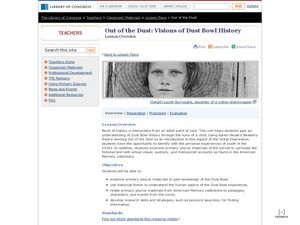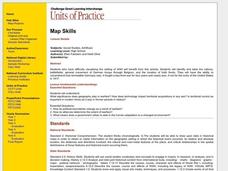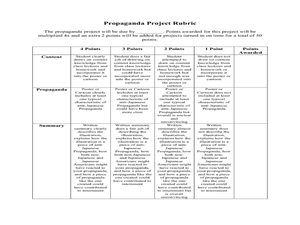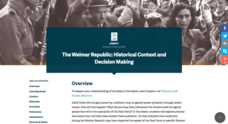Curated OER
Hitler¿¿¿s Fatal Gamble ? Comparing Totalitarianism and Democracy
Students compare/contrast totalitarianism and democracy and examine their roles in World War II. They read a handout, complete a Venn diagram, and participate in a class discussion.
Curated OER
Holocaust: A Personal Story
Eighth graders listen to an account of the Holocaust. In this World War II lesson, 8th graders listen a guest speaker discuss the Holocaust experience. Students then complete an assignment based on what the guest speaker shared.
Curated OER
Japanese American Internment
Eleventh graders examine Japanese-American internment. In this World War II lesson, 11th graders research primary sources that they locate to learn about the experiences of the interned Japanese-Americans. Students then complete a...
Curated OER
Wilbur West, An Oral History
Third graders listen to the history of Wilbur West, a World War II veteren. They discuss how he is an important piece of history. They write a persuasive essay on the importance of Veteren's Day.
Curated OER
American Soldiers’ Experiences During WWI
Learners investigate the effects of war on soldiers. In this World War I lesson, students link to the provided Web link to locate primary sources about American soldiers during the war. Learners write historical narratives based on their...
Curated OER
Prisoners in Another War
Learners examine the role of the Geneva Convention. In this world history instructional activity, students investigate primary sources that prompt them to consider the evolution of the Geneva Convention.
Curated OER
The United States and the Soviet Union were Engaged in a Cold War
Students work together at figuring out the definition for what cold war means. In this social science lesson, students listen to "The Butter Battle Book" by Dr. Seuss and recognize how this story relates to the cold war between the...
Curated OER
Out of the Dust: Visions of Dust Bowl History Lesson Overview
Students complete activities with the book Out of the Dust by Karen Hesse. In this literature lesson, students read this story and view the Dust Bowl history from the eyes of a child. They discover the Great Depression and life in the...
Curated OER
GRAVE OF THE FIREFLIES
Students engage in a video activity to research the effects of war upon the Japanese to live in the world after World War II. They answer specific questions in order to complete the unit.
Curated OER
Europe Before and after WWI
Eighth graders compare and contrast maps of Europe before and after World War I. In this World War I lesson, 8th graders color and label maps of Europe prior to the war and after it. The historical maps can be accessed online.
Curated OER
Eyewitness to History W.W.I.
Eleventh graders take a closer look at the weapons used to fight World War I. In this World War I lesson plan, 11th graders complete a reading assignment, discuss it, and form research groups. Students work in the groups to...
Curated OER
The Holocaust
Eighth graders consider how something like the Holocaust could happen. In this Holocaust lesson, 8th graders analyze German propaganda that was used to garner support for World War II. Students discuss which pieces of propaganda were the...
Curated OER
What Would You Do?
Eleventh graders determine whether or not they would have dopped the atomic bomb. In this Truman presidency lesson, 11th graders research primary and secondary sources about the Manahattan Project and World War II. Students...
Curated OER
Christmas in the Trenches, 1914
Learners investigate the role of Trench Warfare in World War I. In this World War I lesson, students read Christmas in the Trenches, 1914 and then discuss the conditions of war in trenches and how Christmas 1914 interrupted the war....
Curated OER
Map Skills
Students examine the nations, battlefields, troop movement of the Germans through Belgium and the location of both fronts during World War I by creating a map. They visualize the strength of the Germans early in the war.
Curated OER
Japanese American Internment: Examining Racial Tensions
High schoolers discover how racial tension led to Japanese Internment. For this World War II lesson, students analyze political cartoons and posters related to the movement of Japanese-Americans to internment camps in the wake of the...
Curated OER
Voices of Tragedy and Horror: Remembering the Holocaust
Students consider the implications of the Holocaust. In this World War II lesson, students read the graphic novel Maus at the end of a unit on World War II. Students discuss the impact of reading about the Holocaust as well as theme of...
Curated OER
Introduction to the Holocaust
Eighth graders examine the implications of the Holocaust. In this human justice lesson, 8th graders unknowingly participate in a segregation simulation and discuss its outcome. Students compare the simulation to the discrimination that...
Curated OER
Voices or the Holocaust
Eighth graders determine how victims of the Holocaust fared. In this World War II lesson, 8th graders collaborate to research Holocaust deportation, ghettos, resistance, hiding, escape, and survival. Students discuss their findings and...
Curated OER
Dr. Seuss Political Cartoon Questions
In this primary source analysis worksheet, students examine a political cartoon by Dr. Seuss about World War II and then respond to 5 short answer questions.
CHPCS
The United States in the 1920s: The New Negro Movement and the Harlem Renaissance
Music, writing, and activism all tell the story of history! The resource uses these elements and more in a presentation to discuss the Jazz Age and Harlem Renaissance. Your class views biographies, discusses important events, and...
US Institute of Peace
Perspectives on Peace
Is peace simply the absence of war, or is there more to the story? Young social scientists define peace in the second installment of a 15-part series. Groups work together to explore cultural concepts of peace and the peacemaking process...
Facing History and Ourselves
Us and Them: Confronting Labels and Lies
Stereotyping and discrimination based on religion catalyze many atrocities in the world. Explain the awful treatment of Jews and the lies Nazis spread by using an informative yet sensitive resource. Learners participate in a warm-up and...
US House of Representatives
“‘The Negroes’ Temporary Farewell,” Jim Crow and the Exclusion of African Americans from Congress, 1887–1929
Despite some advances made during the Reconstruction Era following the Civil War, the period from 1887 through 1929, African Americans serving in Congress suffered severe setbacks due to Jim Crow Laws and voter suppression. Class members...

























